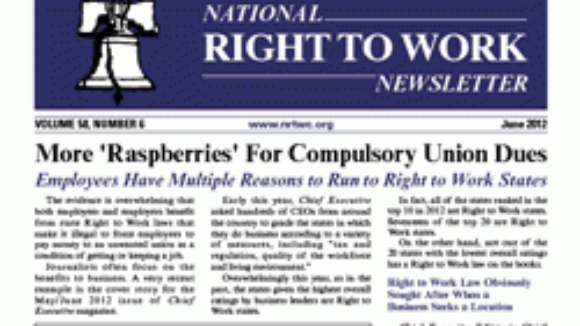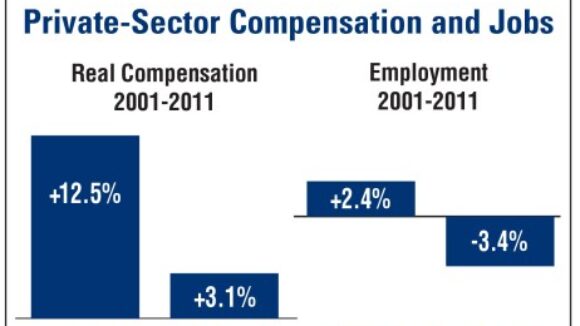‘It Clearly Is a Subsidy For the Unions’
Committee Fights Against ‘Official Time’ For Federal Union Bosses (click to download newsletter) One critical early milestone in the rise of government unionism in America was President John…

Committee Fights Against ‘Official Time’ For Federal Union Bosses (click to download newsletter) One critical early milestone in the rise of government unionism in America was President John…

Sen. Rand Paul looks at the big labor flip flop on ObamaCare is hurting their members. “If you like your doctor, you will be able to keep your doctor. Period. If you like your health care plan, you will be…

National Right to Work President applauds legislation that would prevent union officials from extracting union dues from workers as a condition of employment Congressman Steve King Washington, DC (March 5, 2013) –Today, Congressman Steve King…
Sen. Rand Paul (R-KY) has introduced National Right to Work law legislation to protect workers across the nation from being forced to join or pay union dues against their choice. S. 204 would “would preserve and protect the free choice…

Click here to download a copy Right to Work Activism Spreading Like Wildfire — Victories in Indiana, Michigan Build Momentum in Other States Big Labor…

Click here to download a copy More ‘Raspberries’ For Compulsory Union Dues — Employees Have Multiple Reasons to Run to Right to…

Compulsory Unionism Negatively Correlated With Compensation Growth (source: National Right To Work Committee April 2012 Newsletter) By prohibiting compulsory union dues, state Right to Work laws spur the growth of private-sector employee compensation in the form of wages, salaries, benefits and bonuses, as well as employment growth. Last month, the U.S. Commerce Department's Bureau of Economic Analysis (BEA) issued its estimates for 2011 state personal income. The BEA also issued estimates for an array of specific kinds of income, including employee compensation, at the state level. The 2011 BEA income data in general, and the compensation data especially, show once again that there is a strong negative correlation between compulsory unionism and economic growth. Overall, private-sector employee compensation (including wages, salaries, benefits and bonuses) grew by 6.4% nationwide over the past decade, after adjusting for inflation. Historically speaking, this was slow growth. However, states that protect employees from being fired for refusal to pay dues or fees to an unwanted union typically fared far better than the rest. (From 2001 to 2011, 22 states had Right to Work laws prohibiting forced union dues on the books. Last month Indiana became the 23rd Right to Work state.) A review of how compensation and jobs grew (or failed to grow) in each state suggests the U.S. Congress could dramatically improve America's economic prospects for the next decade by repealing forced union dues and fees nationwide. Current federal law authorizes and promotes the payment of compulsory union dues and fees as condition of getting or keeping a job. Right to Work States' 2001-2011 Compensation Increase Nearly Double the National Average

Compulsory Unionism Negatively Correlated With Compensation Growth (source: National Right To Work Committee April 2012 Newsletter) By prohibiting compulsory union dues, state Right to Work laws spur the growth of private-sector employee compensation in the form of wages, salaries, benefits and bonuses, as well as employment growth. Last month, the U.S. Commerce Department's Bureau of Economic Analysis (BEA) issued its estimates for 2011 state personal income. The BEA also issued estimates for an array of specific kinds of income, including employee compensation, at the state level. The 2011 BEA income data in general, and the compensation data especially, show once again that there is a strong negative correlation between compulsory unionism and economic growth. Overall, private-sector employee compensation (including wages, salaries, benefits and bonuses) grew by 6.4% nationwide over the past decade, after adjusting for inflation. Historically speaking, this was slow growth. However, states that protect employees from being fired for refusal to pay dues or fees to an unwanted union typically fared far better than the rest. (From 2001 to 2011, 22 states had Right to Work laws prohibiting forced union dues on the books. Last month Indiana became the 23rd Right to Work state.) A review of how compensation and jobs grew (or failed to grow) in each state suggests the U.S. Congress could dramatically improve America's economic prospects for the next decade by repealing forced union dues and fees nationwide. Current federal law authorizes and promotes the payment of compulsory union dues and fees as condition of getting or keeping a job. Right to Work States' 2001-2011 Compensation Increase Nearly Double the National Average

Right to Work stalwart Sen. Rand Paul is joining National Right to Work legal challenge of President Obama’s illegal recess appointments to the National Labor Relations Board (NLRB). Politico reports: The Kentucky Republican appears to be the first sitting…